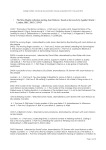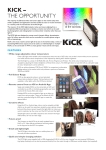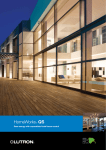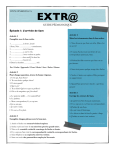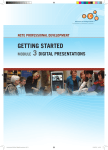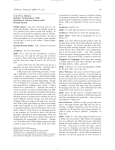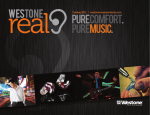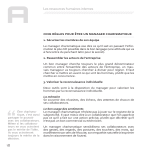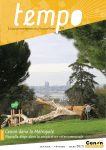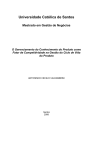Download James Burns interview with Becky Shaw for Art Sheffield 2010:
Transcript
James Burns interview with Becky Shaw for Art Sheffield 2010 James: Your work for Art Sheffield is a 6 act play written during a residency you did in 2004 for age concern, can you tell us a bit more about that? Becky: The theme for Art Sheffield this year is Life: A User’s Manual and is based on a 70’s novel by the French writer Georges Perec and it is a crazy novel where Perec traces the life happenings in a tower block in minute description. He enters the interior domestic spaces of all these different people in this tower block describing them in ridiculous anal detail and how their lives all interact and the mystery. I think they chose the theme Life : A User’s Manual because it’s a reflection on objects and daily life to communicate something but they are also interested in and are looking at this idea of effect which crudely speaking means emotional-ness. But it is a bit more complicated than that, its about how art works are both carriers of things that are personal and emotional, and that they are objective realities, and about how in life we navigate between those areas - things that are personal and things that are objective. Art works carry personal information but they have an objective form -they are this big, this long. So Life: A User’s Manual, tries to look at that notion of emotional-ness and I know it seems strange to think about that in relation to art but emotion has been very out of fashion in art for long time. Conceptualism and rigorous research-based art has been what people have been talking about in art and not the emotional power, so it is a new phenomena. James: So were you trying to bring emotion back in away with this work? Becky: No I think I also have an ambiguous relationship to what is emotional in an art work and I am very interested in how you make work that is quite objective, almost quite cool but has an emotional underbelly. I am interested in situations that are very emotionally loaded like this one involves. It’s a record of me working with a woman called I have called A who is in her own home and who has dementia. I was taken weekly with a care worker into her home with the idea that I would make an art work with her and we are very familiar with art being given to people in care homes and art being given to disadvantaged groups 1 and very powerful things happen sometimes in those situations but then sometimes they don’t. Sometimes art is not the best thing to give people in need and so I was very interested in this situation being emotional charged. I recorded our conversations without her consent and wrote them up into a play and then 6 years later that play is being preformed here. James: It is very emotionally intense situation you are put into and I was interested in how you decided it was going to be a radio play – it was not dramatised, it was just read out in a very stoic and disjointed way and seems to reflect the way people perceive dementia. Why did you decide to do it without the dramatisation? Becky: Well I think there are two things there – I could have made the radio dramatic and dramatised like the Arches, you hear squeaky doors and things being dropped and people say things to help you understand the action but there is none of that in this because it is a literal verbatim recording of a real conversation. I didn’t say she scratched her self or moved, the mini disk recorded the sound and nothing else and also 6 years later I can’t remember but I deliberately didn’t dramatise. Two things I didn’t deliberately make a physical play and I deliberately didn’t dramatise or have actors characterise for radio because I was very uncomfortable with the potential for parody and for acting out a crazy old lady but also I wanted some means to reflect the quality of her language as a material form, almost detached from the characters because the language is so extraordinary and I think if you had been preoccupied with the story, the body or the hair cut – it would have interfered with that. James: You talk about the tragedy and comedy of care and how A was treated by the care system, is that something you wanted to put forth in your work? Becky: Very much so but not in a political or social way as I don’t have that background and I don’t want to jump on that bandwagon to improve care for everybody because that’s not my profession. I suppose I have more of a philosophical interest in it, in that I believe people should be taken very seriously and just because they are old, ill or young that doesn’t render them stupid. If it was my dad in that situation I would want someone who actually listened to him. I did a visual arts PhD and spent 3 years working with Marie Curie in Liverpool where I made work with the patients as a way to see if you made difficult contemporary art with them can you share a collective language and one of the things I felt incensed about was seeing men who had been engineers, and this isn’t just in Marie curie, its across the board, being asked to make soap holders with lace and those sort of activities reduce people down to somebody else’s taste, which I object to. So it’s more that philosophical thing about trying to expect the most of people and not the least of them. James: That’s very admirable and I know that in this country in particular, culture seems to be moving towards old is bad, whereas if you look everywhere else, age is meant to be revered. Do you think that the way peoples’ attitude to age is effecting the way that care is given? Becky: Absolutely I think we have a strange attitude to age and we think that old means useless instead of informed, intelligent, sensitive and sophisticated and I suppose I am at that age where my parents are becoming pensioners and seeing 2 them somehow undone by society – they are not very old but are retired. My mum was a teacher and has masses of energy and has a lot to contribute to society and the only thing that seems available to her is in Oxfam. There is nothing wrong with that but her abilities would not be used enough in that situation. Retiring gracefully is also fine but there is some crazy waste of energy in Britain in particular. James: This kind of theme of age and retirement – is this a theme in a lot of your work or something you have done this one time? Becky: That’s a really interesting question. It’s not in a literal way, in that I don’t always work with elderly people. I like working with elderly people a lot however it’s really knowledge that I’m interested in. It grieves me enormously when I see things dying out. I don’t like the middle class drive to maintain things for the sake of it. I don’t think things should be maintained just because they are pretty or quaint or anything like that, but when there is manual or technical knowledge that we think has no place in society because we are uncomfortable with industrial production – there is a whole vast array of knowledge there dying out and disappearing with that generation and that grieves me enormously. James: Is that one of the reasons you chose to put it on the radio because I know the form of a script or play is very accessible but putting it on the radio and not having it exhibited in a gallery but having it on something that is accessible to everyone and something that you can hear in your own living room – a personal way to express the work, is that something you are passionate about? Becky: I am but I am not interested in access for the sake of access, I am uncomfortable with schemes that try and make art available to all because very often it involves lowering and comes with a baggage of people not being able to get sophisticated or difficult things and I don’t believe in that. I think it’s rubbish so I object to that but the reason I chose radio was that I like the way it goes into living rooms, not because its accessible but because it’s interesting to have this thing enter your room but also because it travels - particularly if its radio that has been talked – It’s come out of someone’s mouth at some point, travelled through their body and gone through the airwaves then gone into your ear. So that absolute biological thing about sound, but we forget about that, and we think it is disembodied. It really interests me that it has come from visceral bodies, tongues and saliva and goes into cochlea’s that have little hairs on them so it is those sort of things that interest me rather than a passion for egalitarianism. I do believe that everyone can access lots of things but I don’t believe altering quality. James: You don’t believe in access for the sake of access? Becky: No I think people should want to access it. James: Do you think your work fits in to Art Sheffield and what are your thoughts of being in this group exhibition with this type of work? Becky: Firstly I am a bit of an advocate for the whole Art Sheffield project. I think it takes an extraordinary mass amount of energy to make something important happen here and I have lived in quite a few post industrial Northern cities including Liverpool, which has its Biennale, and actually I think what Sheffield Contemporary Art Forum 3 pulls off here is such a precise tight thing and blows a lot of those other things out of the water. I think it’s amazingly high quality and well thought out so I am very happy to be in it and I’m really interested in some of the artists work and I am particularly interested in the sculptural works. I am really interested in Nina Canell’s work at Bloc which involves steam. It’s subtle but very physical and interestingly. I am less interested in works that are more obviously connected to mine, so the ones that involve the use of other people or words and video. It is quite weird being in this format because my work is not very visible within it because it’s on the radio but I like that and I do kind of like to test expectations of performance and visibility that we expect from art, sometimes to my detriment. James: You mentioned that in a gallery everything’s very visual and you don’t wan to stop and listen to something that is piped in – do you find it hard that everyone else got their visual easy work? Becky: I don’t think a lot of the work is easy or anymore accessible than mine actually. I think probably 5 years ago I might have felt like I’d shot myself in the foot because I’m not in the party so to speak but because I really want to make lots of really good work and I am quite ambitious. But I’ve stopped caring too much about how well known I am. The people who like your work search it out and share a passion and an interest and they very often turn into your friends and I enjoy that type of audience. By now if I was going to be in all the art books it would have happened so I don’t expect that. I get a thrill from making all the right decisions about how the work gets out in to the world rather than making compromises for the sake of being in the shows as big as I can be. James: When you were younger and just becoming an artist what were you really wanting to be, was it in the spot light? Becky: Oh definitely – well actually it’s interesting, when I first left art school I was far more radical and I didn’t want any of that visibility and I didn’t like London or the art market and I was far more rebellious and probably after I had been making work for about 5-6 years I started to want to be out there and I think the desire to be mainstream and have lots of people see your work is really good and important and not be sneered at as you should want people to see your work, but I think I now understand that audiences select the viewing of the work. Not everybody in or out of the art world likes Tracey Emin, their audiences are selective. James: This work was from a while ago and adapted for the show. What is it that you are working on now? Becky: I have been trying to make a work for a gallery in Colchester for a very long time. It’s a brand new gallery that has been built called First Site and it’s an amazing gallery space and they have this beautiful technical stone – an aggregate that they use in the work surfaces and this building is built upon (as it is Colchester) a site of archaeological importance and what they do instead of digging that up the pack rubble on top of the remains to protect it and build the building on top of it. So when there is time and resources they will excavate then and I am really interested in the relation between these two aggregates, below and beneath ground and I want to go to this technical stone that has a load of quartz in it that’s mined In Italy (at an original Roman quartz mine) and I want to make a work where I work with these 4 people who make this stone so to develop something for the gallery but it is taking me a very long time to make that happen. Also there is a table in the Lady Lever Gallery in Port Sunlight, Liverpool that has something like 200 minerals inlayed in the top of it in all different colours. It’s disgustingly kitsch with huge gothic green gold carved legs and these crazy colours and it’s like the epitome of bad taste and showing off and it is probably 150 years old maybe older and I want to remake this table and follow the routes back to getting hold of these minerals if I still can because we believe we can access things better now than we could, but I have a feeling we won’t be able to get hold of this stuff so I have no idea what the work is. It’s probably a piece of research that may or may not end up in a table but that’s sort of what I am trying to get going and I am also trying to set up a residency where I work within an anthropology department but to be frank I am not quite as productive as I used to be as I have two very small children so that is partly what I am doing as well. James: That sounds very interesting and I would like to see more of your work. Becky: Thank you and great questions. 5






